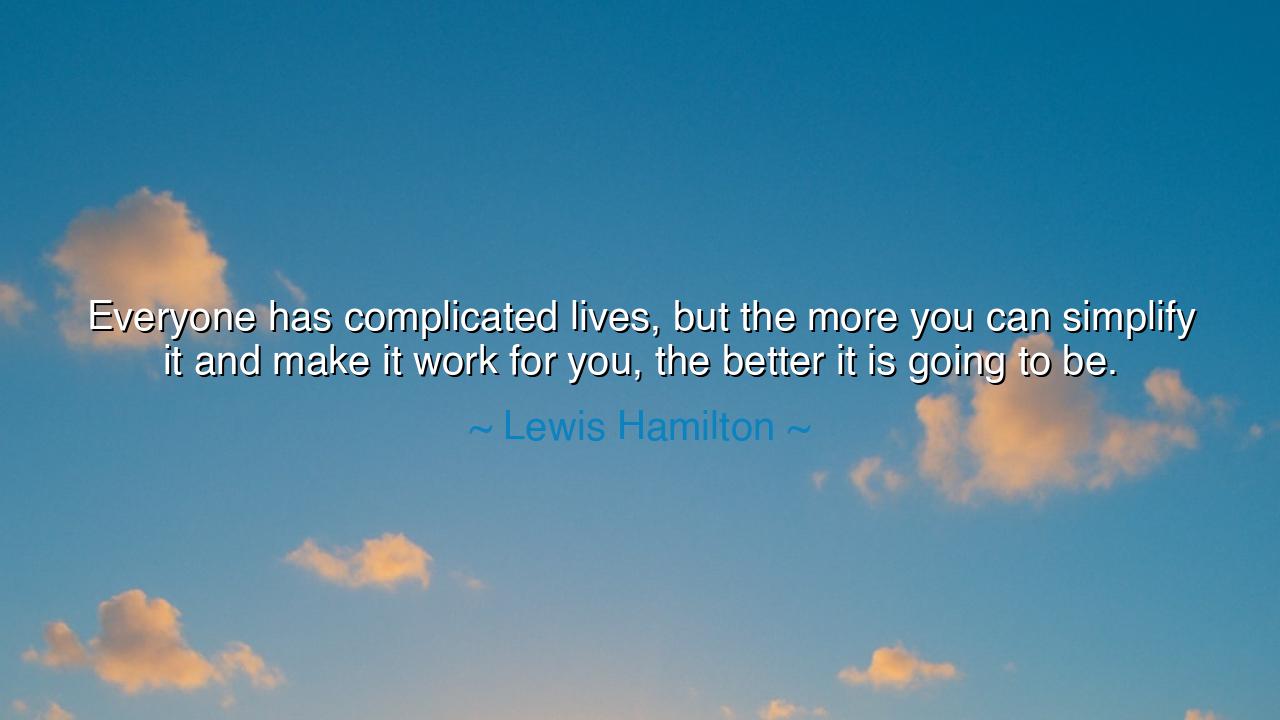
Everyone has complicated lives, but the more you can simplify it
Everyone has complicated lives, but the more you can simplify it and make it work for you, the better it is going to be.






Hearken, O children of the ages, to the words of Lewis Hamilton, who speaks with the clarity of one who navigates storms both within and without: “Everyone has complicated lives, but the more you can simplify it and make it work for you, the better it is going to be.” Here lies the timeless teaching that life, though tangled and vast, can be approached with wisdom, discipline, and the art of discernment. To simplify is not to diminish, but to see the essence of what truly matters and to align the currents of existence with one’s purpose.
In the annals of ancient thought, the elders spoke often of the labyrinth of human life, where desires, duties, and distractions entwine like wild vines. To live without awareness is to be ensnared by this complication, yet those who seek to simplify their path discover a clarity that allows the spirit to work with strength and intention. The complicated lives of men and women are universal, yet it is the skill of the wise to extract from them the currents that serve growth, joy, and fulfillment.
The origin of this teaching is ancient, found in the scrolls of sages who counseled that virtue lies in understanding the few truths that guide life, rather than being consumed by the many trivialities that distract it. Hamilton, in the voice of the modern age, echoes this wisdom: the mastery of life comes not from control over all things, but from the ability to simplify, to discern what serves and what hinders, and to make the flow of life work in one’s favor.
O seekers, take heed: to simplify is to honor your own essence, to unburden the spirit, and to cultivate space for clarity and strength. A life complicated beyond measure dims the light of the soul; a life consciously refined allows the heart and mind to rise in harmony. Every choice, every alignment, becomes an act of sacred design, shaping a path where complication yields to intention and purpose.
Let this teaching endure, children of the future: the world will present endless complications, yet the art of life lies in the quiet mastery of simplifying and making it work for your spirit. In this, one finds peace, power, and the grace to move through existence with courage and wisdom, knowing that clarity, not chaos, is the true companion of a life well-lived.
If you wish, I can also create a more poetic and ceremonial version, where simplifying life is depicted as a sacred ritual of clearing the soul’s path. Would you like me to do that?






TDNguyen Trong Duc
Lewis Hamilton's perspective on simplifying life makes me think about how we often overcomplicate things unnecessarily. But I’m curious—how does one decide what to simplify in their life? How do we determine what’s essential and what’s just extra baggage? I think the real challenge lies in knowing which areas of our lives can benefit from simplification, and which ones might need more attention and complexity.
TNNguyen Thao Nguyen
I wonder, does simplifying life truly make it better, or does it just make things easier? I think about the effort that goes into chasing our goals, even if it’s messy and complicated at times. What if some level of complexity is actually necessary for growth? How does someone distinguish between what's worth simplifying and what's worth keeping complicated for the sake of personal growth or creativity?
GDGold D.dragon
This quote by Lewis Hamilton is spot on, but what about the parts of life that seem complicated by choice or passion? For instance, pursuing a career you love or dedicating time to family can often feel overwhelming, but isn’t that complexity part of what makes life meaningful? How can we simplify without sacrificing the richness that comes with pursuing what truly matters?
MNminh nhat
I agree with the idea that simplifying life can lead to more peace, but it also makes me question how much of our complexity is a product of societal pressure. Are we simply trying to meet expectations, or is there value in some of the ‘complicated’ things in our lives? I’d like to hear if simplifying means cutting out what doesn’t serve us, or if it’s about finding a better way to manage everything.
Hhieu
Simplifying life sounds appealing, but what about those aspects of our lives that require attention and effort, like relationships or personal growth? Does simplifying them risk making us miss out on deeper experiences? I feel like there’s a balance between simplifying the external chaos and embracing the complexity of inner growth. How does one navigate this fine line, and where do you draw the boundary between simplicity and neglect?